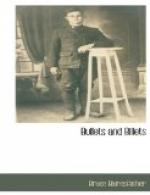Well, after the usual number of long days and still longer nights spent under these conditions, we came to the day when it was our turn to go out to rest billets, and a relieving battalion to come in. What a splendid day that is! You start “packing” at about 4 p.m. As soon as it is dusk the servants slink off across that turnip morass behind and drag our few belongings back to where the limbers are. These limbers have come up from about three to four miles away, from the Regimental Transport headquarters, to take all the trench “props” back to the billets.
We don’t leave, ourselves, until the “incoming” battalion has taken over.
[Illustration: soldier at rest]
After what seems an interminable wait, we hear a clinking of mess tins and rattling of equipment, the sloshing of feet in the mud, and much whispered profanity, which all goes to announce to you that “they’re here!” Then you know that the other battalion has arrived, and are now about to take over these precious slots in the ground.
When the exchange is complete, we are free to go!—to go out for our few days in billets!
The actual going out and getting clear of the trenches takes a long time. Handing over, and finally extricating ourselves from the morass, in the dark, with all our belongings, is a lengthy process; and then we have about a mile of country which we have never been able to examine in the day time, and get familiar with, to negotiate. This is before we get to the high road, and really start for billets.
I had the different machine-gun sections to collect from their various guns, and this not until the relieving sections had all turned up. It was a good two hours’ job getting all the sections with their guns, ammunition and various extras finally collected together in the dark a mile back, ready to put all the stuff in the limbers, and so back to billets. When all was fixed up I gave the order and off we started, plodding along back down the narrow, dreary road towards our resting-place. But it was quite a cheerful tramp, knowing as we did that we were going to four days’ comparative rest, and, anyway, safety.
On we went down the long, flat, narrow roads, occasionally looking round to see the faint flicker of a star shell showing over the tops of the trees, and to think momentarily of the “poor devils” left behind to take our place, and go on doing just what we had been at. Then, finally, getting far enough away to forget, songs and jokes took us chirping along, past objects which soon became our landmarks in the days to come. On we went, past estaminets, shrines and occasional windmills, down the long winding road for about four miles, until at last we reached our billets, where the battalion willingly halted and dispersed to its various quarters. I and my machine-gun section had still to carry on, for we lived apart, a bit further on, at the Transport Farm. So we continued on our own for another mile and a half, past the estaminet at Romerin, out on towards Neuve Eglise to our Transport Farm. This was the usual red-tiled Belgian farm, with a rectangular smell in the middle.




